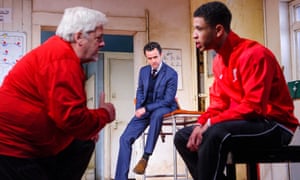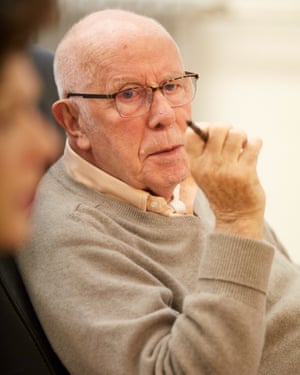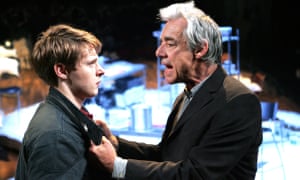In his slim volume of essays on the nature and purpose of drama, Three Uses of the Knife, the American playwright David Mamet begins by considering baseball. “What do we wish for in the perfect game?” he asks. “Do we wish for Our Team to take the field and thrash the opposition from the First Moment, rolling up a walkover score at the final gun?
“No. We wish for a closely fought match that contains many satisfying reversals, but which can be seen, retrospectively, to have always tended toward a satisfying and inevitable conclusion. We wish, in effect, for a three-act structure.”
The true sports lover might beg to differ. There is many an England cricket, football or rugby fan, too accustomed to disappointment, who would happily settle for a one-sided victory rather than unsettling uncertainty.
But the arts aficionado who loves sport searches for the parallels between drama on the field and pitch and that unfolding on a stage. And the basic sense that there is an instructive and energising synergy between the two is, by chance, being tested in theatres up and down the UK.
It was the playwright Richard Bean who quoted Mamet’s essay when we were talking about The Nap, his new play about snooker, which will be performed in the Sheffield Crucible, the home of that sport. Rehearsals were taking place in the Jerwood Space in London, where, in the room next door, work was under way on Phil Porter’s The Man With the Hammer, another sporting drama – this time about cycling – which is about to open at the Theatre Royal Plymouth.
This hits the stage just as another cycling play, Beryl, by the writer and actor Maxine Peake, produced in association with the West Yorkshire Playhouse, has its London premiere, while, at the West Yorkshire Playhouse itself, The Damned United, adapted from David Peace’s book about Brian Clough’s chaotic 44 days in charge of Leeds United, is unveiled.

All of this, and the fact that Patrick Marber’s The Red Lion, a play set in the dressing room of a non-league football club, is still a recent memory, indicates that there is something in the air that has turned sport into a fertile terrain for drama. Of course, there have always been plays about sport – David Storey’s The Changing Room, written in 1971, being both the perfect example and a template for many works that followed.
But this feels like something else – an indication that sport in all its multifarious forms has become so dominant that it is impossible to avoid. Dilwyn Porter, father of playwright Phil, and a professor of sports history and culture at De Montfort University, says its ubiquity makes it “the wallpaper of our lives.” It’s always on in the corner of the pub, and discussed obsessively online and in the papers. Multi-channel TV and the internet mean it is possible to follow not only major sporting events, but even the most minor ones, streamed to a screen near you at any time of the day and night.
For theatres, wanting to attract a different kind of audience, the cultural weight given to sport makes it seem like a golden opportunity. If you love football, so the logic goes, perhaps you might try a play about the beautiful game with Shakespearean implications rather than one about an ancient king by the playwright himself.
There are some indications that this assumption is untrue. Both The Red Lion and the musical Bend It Like Beckham seemed to slightly underperform at the box office, because football was as off-putting to some as it was enticing to others.
Marber says he shied away from the subject initially. “I had the idea for The Red Lion with a slightly heavy heart because I thought I would be writing a play without women in it, and one that really is about men in a particularly male environment. I knew that I was limiting my audience with every page I wrote. There are whole areas of the play that are gibberish if you don’t know anything about football, but that was the only play I was able to write at the time.”
Bean also hesitated, but for a slightly different reason. It was his director Richard Wilson who suggested a play about snooker that opened with the set of the final of the World Snooker Championship, its green baize tables set up in the very space where they are really used. “I said actors can’t play snooker. I knew it wouldn’t look very good. We all know that films about football are usually terrible because you want to show that wonderful all-conquering Leeds United, and you get some fat bloke from some agency to play Billy Bremner. It just never looks right.”

He could only progress once he came up with a plot – about match fixing – that meant the snooker in the play would be convincing “and if it looks rubbish the audience would know why that person missed an easy shot”. The Nap also employs professional snooker player John Astley alongside its star Jack O’Connell, both as a coach and for added authenticity.
For Porter, the challenge of putting the physical aspect of cycling on stage in a tiny theatre was part of the appeal. His play has its three actors on bikes, cycling throughout, to emulate the way cyclists drive themselves to the point of exhaustion where – in cycling parlance – they meet the man with the hammer, who knocks them sideways. “It is seen as a rite of passage to have met him,” he explains.
By combining physical exertion with psychological drama, Porter seeks to explore one of the mysteries at the heart of sport – the nature of heroism. “Obviously the notion of a hero is something intrinsic to both sport and drama. It seems to me that we live in a time when it’s very difficult to commit to having a hero since there is every chance you’ll wake tomorrow to discover they are a cheat, a bully or something. This is a problem within sport but also with our politicians, entertainers and so on.”
Cycling offers a fitting metaphor for this, not least because, as a sport, it combines a purity of philosophy – of athletes driving themselves beyond all endurance to achieve a kind of perfection – with a long history of corruption. “Even in the early days of cycling, people used to take something called pot belge which is a mixture of heroin, amphetamines and brandy. Yet at the same time it encourages a kind of passion that goes beyond cycling itself and brings in all of life’s philosophies.”
These are notions that film has also explored – and it’s a good deal easier to depict the Tour de France on a cinema screen than in a cramped studio theatre. But despite a towering central performance by Ben Foster, The Program failed to offer as much insight into Lance Armstrong’s mind as the countless books written on the cycling cheat’s career. The cinematic version of The Damned Utd relied heavily on Michael Sheen’s charismatic impersonation of Clough, yet didn’t come near to touching the dark heart of Peace’s original novel.
The cockpit of sport reveals people in all their messy humanity – and all their nobility too. Hence the success of an entire genre of boxing movies. And hence the appeal, too, of Peake’s Beryl, about Beryl Burton, the English racing cyclist who beat the world for two glorious years from 1967.
Like all sporting dramas, Beryl isn’t just about the sport itself. It’s a love story, and a love letter to the British working class of that era and their aspirations. The main attraction of the story for her, says Peake, was of a woman battling against the odds to be the best.
Success against the odds is indeed one trope of the successful sporting drama. Another – and the one that attracts Bean – is sport’s power as a metaphor. “Sport is an agreed fiction,” he says. “There are rules, laws, an agreed set of conventions. And once you have got that, you get the cheats coming in – and they are destroying the game, which is the social construct. They are destroying society, essentially. That’s what’s interesting to me when talking about sport.”
The fact that big money and gambling have infected sport, making them more susceptible to corruption, is fuelling interest in bringing different games to the stage. “But the main point is, if you go and see a play about sport, the play is not going to be about the sport,” says Bean. “It’s going to be about the humanity, about the human condition, about a person who is not skilled at making life decisions making life decisions. It’s those things.”
Marber agrees. His experience of raising the money to back a supporter-owned non-league club underpinned The Red Lion, and he is both a keen Arsenal supporter and life-long sports fan, yet The Red Lion wasn’t simply about football. The shabby changing room provided a backdrop to an elegy for lost innocence and a classic confrontation between a man who was a giver, and one who was a taker.
“Really I think a good play is a good play and there’s no reason why the sports play should be any more or less satisfying than a play about science which is also very vogueish at the moment,” Marber says. “It’s all material, and it’s all character and I just don’t think there are any rules about it.”

Marber, Porter and Bean all have form when it comes to theatre with a sporting setting. Marber’s debut Dealer’s Choice was about poker, Porter’s The Christmas Truce focused on the famous football game in the trenches of the first world war, and Bean’s The English Game turned a cricket match into a meditation on the state of the nation. At one level, they are clearly pursuing an aspect of life that interests them. Nevertheless, Samuel Beckett played rugby and cricket (he is the only Nobel prize winner with an entry in Wisden) and was a good enough boxer to knock his opponents out, yet sport never entered his theatrical world. Harold Pinter was a regular at Lord’s but you would not know it from his plays.
Perhaps what has changed is theatre’s willingness to consider sport as a fitting subject for drama. John Godber’s Up’n’Under in 1984 – remembered fondly by all who saw it – showed what could be done to transform an unpromising subject (rugby league) into stylish theatrical gold. Now, when all theatres prioritise outreach and audience development – “Even with One Man, Two Guvnors I was told they wanted a play that appealed to people who didn’t like theatre,” Bean says – the lure of the siren sport is all the stronger.
Peake believes “there is a huge audience out there for sporting stories – 30% of the audience at the first run at West Yorkshire Playhouse had never been to the theatre before, and I imagine the majority of those people were cycling fanatics and/or Beryl Burton admirers”.
But sports fans are often more committed to the real action than to any approximation of it. “There is this lovely dream that there is this other audience that will come because a play is about pool or poker,” says Marber. “When we opened Dealer’s Choice in the West End, the producer said, ‘Can’t we leaflet in casinos?’ And I pointed out that poker players want to gamble, they don’t want to go and see a play.
“It’s true that a lot of people came to see The Red Lion who hadn’t come to the theatre before. But I’m a sports fan and not such a fan of opera. And an opera about football isn’t going to entice me in. I would rather watch some dodgy Europa League game with two unheard-of teams than take a punt at opera.”
Bean remembers that when his first play was on in London, his father chose to use the opportunity of a trip south to play snooker with an uncle rather than watch the drama. He later wrote a play about Clive Sullivan, the first black British captain of an international team, which was popular with rugby league fans. “I suppose the theory is that if someone comes to see a play about Sullivan they go back and see A Doll’s House by Ibsen. I don’t know if that works, and to be perfectly honest it doesn’t interest me. I have never been very interested in theatre’s problem of reaching out. If it works, then it is simply a good thing to do.”
• The Nap opens at Sheffield Crucible on 10 March sheffieldtheatres.co.uk; The Man With the Hammer opens at Theatre Royal Plymouth on 10 March. theatreroyal.com; Beryl opens at the Rose theatre, Kingston on 8 March rosetheatrekingston.org; The Damned United is now showing at the West Yorkshire Playhouse www.wyp.org.uk.



